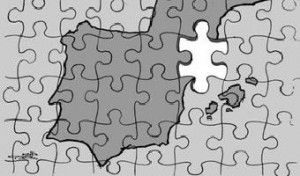Catalans march against Spanish State ruling
Posted by Neil B in Uncategorized, tags: Barcelona, Catalonia, constitution, independence, protest, spainBelow we feature a guest post by Meritxell Ramírez Ollé, a student at the University of Edinburgh, co-creator of a new online local newspaper (Vacarisses Digital) in her hometown of Vacarisses, Catalonia, and a supporter of Catalan independence.
On Saturday, over a million people marched through the streets of the Catalan capital of Barcelona, led by a large banner proclaiming, “We are a nation, we decide ourselves”. The demonstration, which has been widely reported as the largest in the history of Catalonia, was a response to the sentence issued by the Spanish Constitutional Court on the Statute of Autonomy of Catalonia (the charter for Catalan self-rule).
A regressive sentence amid a manipulated decision-making process
Around 2005, in the context of Spain’s system of regional devolution, some in Catalonia felt that it was necessary to revise the earlier Catalan Statute, dating from 1979, and set out a draft for a new charter. Eventually, in 2006, the Statute was passed by both the Catalan and Spanish Parliaments, and it was endorsed in 2006 by a popular referendum in Catalonia. However, the Popular Party (PP) (the main right-wing opposition party in Spain) and the Spanish ombudsman (a holdover from the Spanish Socialist Party (PSOE) [read: the Spanish version of the Labour Party, who are currently in government – Ed.]) appealed the renewed Statute to the Constitutional Court.
The decision-making process of the Constitutional Court (CC) during the issuing of its ruling was not free from controversy: the mandates of three of its twelve members expired nearly two years ago and have not been renewed, and another judge died during his term and has still not been replaced. Despite all the legal abnormalities, and the fact that the CC is a political body whose members are handpicked by the two major parties in Spain, the response to the PP’s and the Spanish ombudsman’s appeal was eventually published one week ago. It briefly concludes:
1) There is no legal basis to recognise Catalonia as a nation. As the Court obsessively makes sure to state twelve times in the text of the sentence, “the only nation within Spain is the Spanish one”.
2) The Catalan language should not be prioritised over Spanish in Catalan administrations, public media and in schools, despite the marginalisation it suffered for centuries and the minority use of Catalan in public spaces.
3) The Catalan people are recognised as “a people” but without any political or juridical powers. The Court aims, with this decision, to underline that the only sovereign people are the “Spanish” people.
4) Although Catalonia has a recognised deficit of investment from the Spanish Government, it cannot ask for similar levels of fiscal autonomy to the Basque tax system, comparable to that of any EU Member State.
5) The judiciary power will remain centralised in Madrid.
A Constitutional sentence above Catalans’ will
While the two main parties in the Spanish Parliament (PP- PSOE) have accepted the sentence with all its legal irregularities, all Catalan parties, except for the Popular Party (PP) in Catalonia and the small Anti-Catalan Nationalism Party (Ciudadanos), are unanimous in their analysis. They argue for respect for Catalonia’s identity and for what the Catalan people have voted for in a binding referendum, which the Spanish Constitutional Court has undermined. However, Catalan leaders differ in their suggestions as to how to come out from this political cul-de-sac. On the one hand, the Catalan Socialist Party (PSC) and the Catalan Eco-Socialist Party (ICV) in office, and the centre-right Catalan Nationalist Party (CiU) insist on re-negotiating with the Spanish Government a new agreement regarding Catalonia’s national ambitions into the Spanish Constitution. On the other hand, the left-wing Catalan Independence Party (ERC) (also in office), and the ex-Barcelona Football Club president, Joan Laporta, who has just created a new party, Democràcia Catalana, advocate for Catalonia’s secession from Spain. In this sense, Saturday‘s demonstration was clearly dominated by pro-independence sentiments and positions, and it is probable that the upcoming Catalan elections in November this year will also be framed around the issue of independence.
The CC’s 2010 sentence: the latest (and last!) frustrated attempt for a federal Spain
However, the debate over the CC’s judgement, and of Catalonia’s relationship with the Spanish state, is not a new issue. The attempt to create a federal Spain, with Catalonia on the inside, has been at the heart of much of the country’s modern history, but it has continued to fail, often with fatal consequences for Catalonia. In the 19th century, the First Spanish Republic, established in 1873 by the Catalan federalist Estanislau Figueras I de Moragas failed as a result of anti-federalist coups and ended up with the restoration of the Bourbon monarchy.
Later, the proclamation of the Second Spanish Republic in 1931, and the first Catalan Statute in 1932, were overthrown by the fascist Francisco Franco and led to the bloody civil war in 1936. As George Orwell describes in his book Homage to Catalonia, written while he served as both a private and a corporal in Catalonia and Aragon in 1936, the effects the civil war had on Catalonia were devastating.
After 35 years of dictatorship, and after the passing of the Constitution of 1978, Spain created a unique system of regional autonomy, known as the “state of the autonomies”. The result of this system was nothing but a constitution full of ambiguities in its most fundamental aspects, and autonomous territorial structures that did not satisfy anyone, but all political parties accepted it for fear of returning to the ‘old times’ of the dictatorship.
The calculated ambiguity of the Spanish Constitution (which continually needs to be interpreted) requires that all important laws affecting legal autonomy are the result of negotiation, and should be ultimately interpreted by the CC. The latest episode of this process of negotiation was the political sentence of the CC issued last week. This time, the CC has sent one more clear messages to the Catalans: ‘the will of the citizens of Catalonia doesn’t matter, because here we are the only sovereign institution that can make use of democracy’. Therefore, with this sentence, the situation is not ambiguous anymore: Spain is expelling us; Spain has no room for the Catalan, if it not under its subjugation and national indignity. At that point, in my opinion, the only road to a decent future for Catalonia is our political independence. But, that’s a story for another post.



 Entries (RSS)
Entries (RSS)